| The
Peruvian Paso The American Dream Horse |
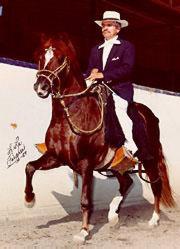 |
LUXURY
Webster's dictionary defines "luxury" as "the use and enjoyment of the best, most precious things that offer the most physical comfort and satisfaction." It may be the single best word in the English language to describe the Peruvian Paso.
This horse, one of the world's last remaining naturally gaited breeds, is becoming a sensation among American horse enthusiasts for several very good reasons. There is "something for everyone" in this smooth, elegant animal; riding comfort, strength and stamina for the avid trail rider; calm tractable disposition so important in the family mount; arrogant, flashy presence and action which set the exhibitor and parader apart from others, and investment potential solidly supported by its relative rarity and increasing popularity. |
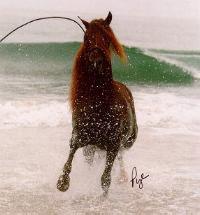 |
A RICH HERITAGE
Although a newcomer to North America, the Peruvian Paso had its origins over four centuries ago in South America, where the horses brought to Peru by the conquistadores and subsequent Spanish settlers were bred selectively to produce the genetic miracle which became the "National Horse of Peru." The judicious fusion of several Old World breeds provided the foundation for the Peruvian horse. The Spanish Jennet gave its even temperament and smooth ambling gait, the African Barb contributed great energy, strength and stamina while the Andalusian imparted its excellent conformation, action, proud carriage and beauty to the new breed. Once established, the Peruvian Paso was maintained in its native country as a closed population, isolated by geography and the dedication of its creators from the influence of additional outside blood.
A BREED APART
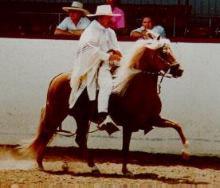 |
Today, the Peruvian Paso transmits its smooth gait to all purebred foals. No artificial devices or special training aids are necessary to enable the horse to perform its specialty - a natural four-beat footfall of medium speed that provides a ride of incomparable smoothness and harmony of movement. In addition to an easy gait, the Peruvian Paso's creators desired their new breed to retain brilliant action typified by lift as the knee and fetlock flex, combined with "termino," a movement of the front legs similar to the loose outward rolling of a swimmer's arms in the crawl. |
Perhaps the most misunderstood of all traits that distinguishes the Peruvian horse is "brio," a quality of spirit that enables this tractable horse to perform with an arrogance and exuberance that can only be described as thrilling. "Brio" and stamina give the Peruvian its willingness and ability to perform tirelessly for many hours and many miles in the service of its rider. Physically, the Paso is a horse of medium size, usually standing between 14.1 and 15.2 hands tall, with a powerful build. He may be chestnut, black, brown, bay, buckskin, palomino, gray, roan or dun; with the solid colors, grays and dark skin considered most desirable. The mane is abundant with fine, lustrous hair that may be curly or straight. |
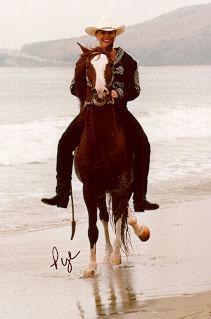 |
PERUVIAN PASO/PASO FINO
Many people assume a close relationship between the Peruvian Paso and the Paso Fino. Although the two breeds share some common ancestors in the Old World breeds that are their forebears, the horses that gave rise to each came to the New World with different groups of settlers and were generated in entirely separate environments for totally different purposes.
The Paso Fino was developed in and around the Caribbean, Central and South America, while the Peruvian horse was born entirely within the borders of the country for which it was named. The Peruvian is somewhat larger, deeper in the body and wider. Both have high head carriage and front leg lift, are smooth to ride and exhibit basically the same four-beat footfall although it is executed differently. The Paso Fino is not bred for the distinctive "termino" and its finest show gait does not require the length of stride so essential in Peru for traveling long distances. In addition, the Peruvian can guarantee transmission of its gait to all purebred foals.
A BRIGHT FUTURE
While the heritage of the Peruvian horse cannot - and should not - be denied, its purely recreational role in this country is shaping an animal that appeals particularly to the American sense of beauty and function. As a result, more and more of this country's horsemen are finding the comfort and excitement of owning a horse that can be ridden successfully by anyone who wishes the thrill and luxury of this marvelous breed.
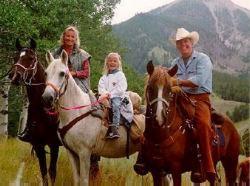 |
The show ring - even at National levels - is full of amateur and junior riders who compete and win in every type of halter and performance class. The PPHRNA National Show has often offered a new horse trailer to the High Point Performance Horse of the Show. It has often been won by a Junior exhibitor. |
The information and photographs in this article are kindly provided by the Peruvian Paso Horse Registry of North America. For further information on this breed, please click here.
The luxurious Peruvian Paso is a natural part of the American Dream and he truly belongs to all of us!
